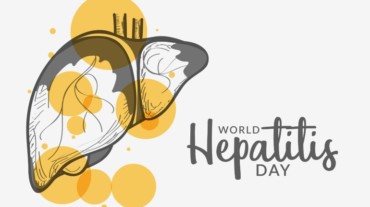
Hepatitis or inflammation of the liver has become one of the pressing public health concerns in India. According to data by the World Health Organization (WHO) in 2016, an estimated 40 million people were suffering from chronic hepatitis B and six to 12 million people were infected with hepatitis C.
Not just that, viral hepatitis caused by hepatitis viruses A, B, C, D, and E results in a whopping economic and social burden on the affected individuals and their families. On the occasion of World Hepatitis Day, let’s brief people about how to deal with hepatitis.
These are the different types of hepatitis
Hepatitis A is passed on when an uninfected person consumes food or water that has been contaminated with the feces of an infected person.
Hepatitis B can be transmitted through semen, vaginal fluids, and blood and it can pass from a mother to a newborn during delivery. Sharing needles and having unprotected sex can lead to hepatitis B.
Hepatitis C is contracted through contact with another person who is infected with the hepatitis C virus (HCV).
Hepatitis D spreads when infectious body fluids (blood, saliva, semen, and vaginal fluid) come into contact with body tissues beneath the skin (through needle puncture or broken skin) or mucous membranes (the thin moist lining of many parts of the body like mouth, throat, and genitals).
Hepatitis E is transmitted through poop or if you drink or eat something that has been in contact with the stool of someone who has the virus.
Also, listen:
Select Topics of your interest and let us customize your feed.
PERSONALISE NOWThese are the symptoms of a hepatitis infection
Fatigue, nausea and vomiting, abdominal pain or discomfort, loss of appetite, dark urine, joint pain, yellowing of the skin, sore muscles, itchy skin, and joint pain are some of the common symptoms of hepatitis. And hepatitis A usually doesn’t require treatment because it’s a short-term illness. Bed rest may be recommended if symptoms cause discomfort. You should consult a doctor and opt for the hepatitis A vaccine, if you haven’t already.
Hepatitis B can be tackled with the help of vaccination. People with hepatitis C are treated with a combination of antiviral drug therapies. Hepatitis D can be prevented by getting the vaccination for hepatitis B, as infection with hepatitis B is necessary for hepatitis D to develop.
No specific treatment is available to treat hepatitis E because the infection is often acute and it typically resolves on its own. That said, hepatitis E can be dangerous in pregnancy. Hepatitis B can be transmitted from mother to child during delivery so special precautions need to be taken.
This is how you can lead a hepatitis-free life
Hepatitis can be self-limiting or progress to fibrosis (scarring), cirrhosis, or liver cancer. It is the need of the hour to tackle hepatitis at the right time and prevent the worst outcome of the disease.
Hepatitis B vaccine is a must
This year’s theme is ‘hepatitis-free future’ and the focus is on preventing hepatitis B (HBV) among mothers and newborns via safe and effective vaccines.
The development of an HBV vaccine using HBsAg protein from HBV carriers as the immunogen to induce anti-HBs, the protective antibody against HBV infection, is a great leap forward. Prevention of HBV infection by immunization is the best way to eliminate HBV-related diseases too. The HBV vaccine is safe and effective.
Hepatitis C vaccine can help too
Patients with drug addiction can receive hepatitis C treatment on the history of their past or current drug use status and can get back to normal life.
Also, watch: